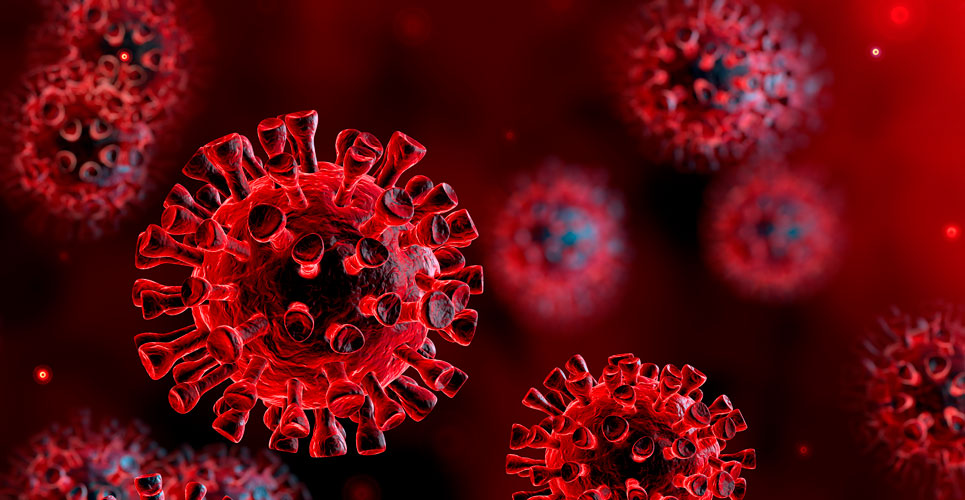There is a good deal of evidence to show that as much as 80% of asthma and between 40 and 60% of COPD exacerbations have a viral cause.1
Furthermore, in the original work from China, it was found that those with an underlying lung problem and who were hospitalised, had a worse prognosis.2
Improvements in asthma therapeutics have led to reductions in mortality as witnessed by a Canadian study in 2000 which observed that regular low dose inhaled corticosteroids (ICSs) were associated with a reduced risk of asthma deaths.3 Moreover, other work has found that the addition of a long-acting beta-agonist such as salmeterol to an ICS regime reduced both the number and severity of asthma exacerbations.4 While these drugs are clearly effective at controlling asthma and COPD and that stopping them will undoubtedly risk a disease exacerbation, a more relevant question given the high prevalence of viral-induced asthma and COPD, is whether ICSs, which have an immunosuppressive action, should be continued during the COVID-19 pandemic? The available evidence, at least based on studies with rhinoviruses, points to an increased risk of respiratory infections with these drugs.
In a recent meta-analysis, Yang et al5 found that the use of ICSs significantly increased the risk of upper respiratory tract infections (URTI) in those with asthma, irrespective of the dose. The same group also observed that high dose ICSs increased the risk of URTI in patients with COPD and that there was a non-significant increase in risk from lower doses.6 In a Cochrane review of ICS use in COPD, it was found that although ICSs reduce the risk of exacerbations and the decline in quality of life, there was also an increases risk of pneumonia.7 Although the evidence for asthma is less clear, a case-controlled study observed an increased risk of pneumonia or lower respiratory tract infections among patients using ICS.8
Exactly how ICSs increase the risk of infections is still not clear though possible mechanisms include reduced production of antiviral interferon9 and an ICS-induced impaired innate and acquired immune response combined with delayed viral clearance.10 In contrast, however, not all studies point to worse outcomes and one study in patients with asthma, found that ICSs did not interfere with the normal preventative viral-induced inflammatory response to infection.11
Given the potential of ICSs to increase the risk of infections, should these treatments be stopped or continued if patients develop COVID-19? A recent review of the literature has concluded that ICS can be continued in patients with COVID-19.12 The authors identified 771 publications although none were found to have data on prior ICS use in patients with several viruses including SARS, Middle East respiratory syndrome (MERS) or even the current COVID-19 infection. In the absence of any obvious harm, the authors suggested that there is currently no reason to stop ICSs in patients with either asthma or COPD who are stable. Although stopping these drugs would clearly increase the risk that either condition would worsen, equally, the current review does not provide any definitive evidence that continued use of ICSs during an infection with COVID-19 is NOT associated with harm, especially given the increased risks associated with infection from rhinoviruses.8-10 While it can be argued that coronaviruses are not the same as rhinoviruses, it does seem somewhat curious that there are currently two on-going clinical trials exploring the value of inhaled corticosteroids13 and the combination of other inhaled corticosteroids and long-acting beta-agonist14 in patients with COVID-19 infection and that these trials are based on in vitro evidence that the combination of an ICS and long-acting beta-agonist were able to curtail excessive inflammation induced by rhinovirus infections.15
In summary, it seems that the current review by Halpin et al12 does not really provide any useful information on whether ICSs should be either continued or stopped during the current pandemic. In many of the rapid COVID-19 guidelines from NICE, it is recommended that ICSs are continued.16 In trying to interpret this review, health professionals should take heed of the aphorism that “absence of evidence is not evidence of absence.”
References
- Johnston SL. Overview of virus-induced airway disease. Proc Am Thorac Soc 2005; 2(2):150–6.
- Huang C et al. Clinical features of patients infected with 2019 novel coronavirus in Wuhan, China. Lancet 2020;395:497–506.
- Sussa S et al. Low-dose inhaled corticosteroids and the prevention of death from Asthma. N Engl J Med 2000;343(5):332–6.
- Matz J et al. Addition of salmeterol to low-dose fluticasone versus higher-dose fluticasone: an analysis of asthma exacerbations. J Allergy Clin Immunol 2001;107(5):783–89.
- Yang M et al. Inhaled corticosteroids and risk of upper respiratory infection in patients with asthma: a meta-analysis. Infection 2019;47:377–85.
- Yang M et al. Long-term use of inhaled corticosteroids and risk of upper respiratory tract infection in chronic obstructive pulmonary disease: a meta-analysis Inhal Toxicol 2017;29(5):219–26.
- Yang IA et al. Inhaled corticosteroids for stable chronic obstructive pulmonary disease. Cochrane Database Syst Rev 2012;7:CD002991.
- McKeever T et al. Inhaled corticosteroids and the risk of pneumonia in people with asthma: a case-control study. Chest 2013;144(6):1788–94.
- Simpson JL et al. Reduced antiviral interferon production in poorly controlled asthma is associated with neutrophilic inflammation and high-dose inhaled corticosteroids. Chest 2016;149:704–13.
- Singanayagam A et al. Corticosteroid suppression of antiviral immunity increased bacterial loads and mucus production in COPD exacerbations. Nat Commun 2018;9(1):2229.
- Southworth T et al. Increased type 2 inflammation post rhinovirus infection in patients with moderate asthma. Cytokine 2020;125:154857.
- Halpin DMG, Singh D, Hadfield RM. Inhaled corticosteroids and COVID-19: a systematic review and clinical perspective. Eur Respir J 2020;55:2001009.
- A trial of ciclesonide in adults with mild COVID-19. https://clinicaltrials.gov/ct2/show/NCT04330586 (accessed May 2020).
- Protective role of inhaled steroids for COVID-19 infection. https://clinicaltrials.gov/ct2/show/NCT04331054 (accessed May 2020).
- Davies JM et al. Budesonide and formoterol reduce early innate anti-viral immune responses in vitro. PLoS One 2011;6:e27898.
- NICE. COVID-19 rapid guideline: community-based care of patients with chronic obstructive pulmonary disease (COPD). NG168. www.nice.org.uk/guidance/ng168 (accessed May 2020).

